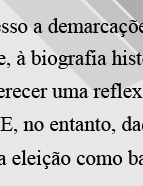

................................
When Visconde de Lagoa, who shared with others of his time a similar desire to build a national biographical archive, outlined his plan to rescue the "great and humble" figures of Portuguese expansion, he did so not so much in the name of these men but of the work they would have accomplished. By the same token, it was with the aim of enriching the documentation of the country's "inalienable rights", as reflected in its statutes, that research within the reconstituted Portuguese Academy of History, much of it biographical in nature, was launched. It was, in fact, a fertile repository of that material from which the most erudite version of the discourse of power on the past was made, as it had materialised in the various figures of national history: from the genealogical elitism of the Marquis of São Paio and the monarchist conservatism of the Count of Tovar or Montalvão Machado to the ecclesiasticism of António Brásio and D. José de Castro.
As in the field of dissemination, in the more restricted circuit of historiographical activity, in which academies and institutes are rightly included, a closer examination of the object does not reveal a decrease in the production of biographies reflecting a change in any academic doxa, at least quantitatively. Not even in the years surrounding the April Revolution, let alone its prolegomena, diminished the relevance that biographical writing had always had in the overall work of these authors. Firstly, the unwavering constancy shown by the Portuguese Academy of History (APH) in producing portraits or biographical notes (the Anais, in particular, continued to provide abundant biographical material well beyond '74) is noteworthy, and even that of those who, by vocation, dedicated themselves to religious history, such as Avelino de Jesus da Costa, António Domingues de Sousa Costa, Leite de Faria, António Brásio, and those, such as Serafim Leite and Domingos Maurício, who had been active since the first half of the century. In the university setting, more specifically, the genre even experienced some degree of popularity, as is evident in the choice of dissertation themes; while some of these works largely focused on the study of a body of work, others were closer to the traditional concept of biography. Examples include the doctoral theses of António Gonçalves Rodrigues on Cavaleiro de Oliveira (1950), Veríssimo Serrão on Infanta Dª Maria (1953), Borges Nunes on D. Frei Gomes (1963), Luís de Oliveira Ramos on Cardinal Saraiva (1972), and Sales Loureiro on Miguel de Moura (1974). There were also undergraduate dissertations, such as that of Maria do Rosário Themudo Barata on the diplomat Rui Fernandes de Almada (1971) and of Fortunato Queirós on the pedagogical ideals of Pedro V (1970), which formed the basis for the extensive work he dedicated to the king and began publishing in the very year of the Revolution.
